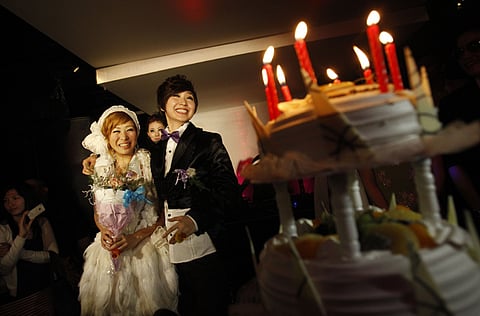Top US lawmakers silent on political impact of gay marriage
US congressional leaders declined to predict fallout of Obama's public support of gay marriage

Washington: US congressional leaders from both parties on Thursday declined to predict the political fallout of what is certain to be a 2012 campaign issue: President Barack Obama's public support of gay marriage.
With the presidential election less than six months away, the political world lit up when Obama became the first US president to publicly support same sex marriage, with both sides debating how his announcement will play out in the campaign.
Help or support Obama bid?
But when asked how Obama's same sex marriage support may help or hurt his re-election bid and the campaigns of Republicans and Democrats in the Senate and House of Representatives, congressional leaders balked.
"The president can talk about it all he wants. I'm going to stay focused on what the American people want us to stay focused on, and that's jobs," House Speaker John Boehner told reporters when asked how the issue would impact the 2012 race.
Boehner reiterated his own personal position on the matter — which happens to match that of Republican presumptive presidential nominee Mitt Romney: "I believe that marriage is the union of one man and one woman," the speaker said.
He declined to take a firm position on efforts by some of his Republican House colleagues who recently voted to ban gay marriage from taking place on US military bases.
The Hill reported that members of the House Armed Services Committee inserted the measure, crafted by Republican Representative Steve Palazzo, into its version of the defence authorisation bill for 2013.
Civil rights
House Democratic leader Nancy Pelosi stressed that while she was a strong supporter of gay rights and Obama's statement was "the right thing to do for our country," the political ramifications were secondary.
"What he did was to advance the cause for civil rights in such a personal as well as presidential way. It's more important than any political consequences," she said.
In particular Pelosi declined to make predictions on how the announcement might impact members of the African-American community, notably some religious groups which are adamantly opposed to same sex marriage, or Democratic fundraising efforts.
"Anything about the politics is incidental," she said.
A Washington Post poll suggests that the US public has been evolving on the topic. In 2006, only 36 percent backed legalising same-sex marriage, but in the latest poll, 52 per cent said they were for it.
But the sudden injection of a divisive moral-social question could hit Obama's prospects in battleground states like Ohio and in North Carolina, where voters this week approved a constitutional amendment banning gay marriage.
Sign up for the Daily Briefing
Get the latest news and updates straight to your inbox



